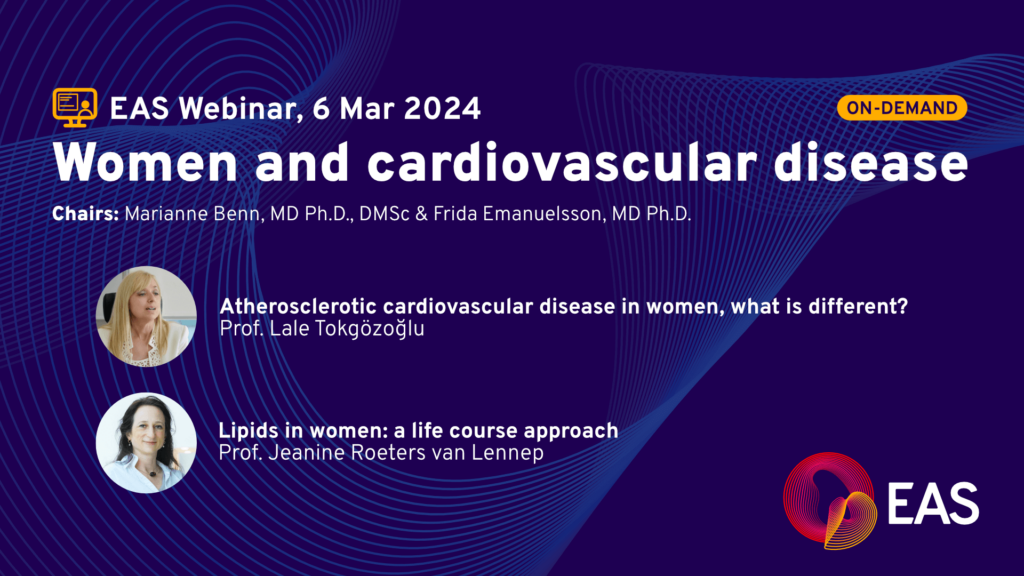Women’s Cardiovascular Health Week 2024

Be part of the major initiative dedicated to Women’s Cardiovascular Health Week 2024 by joining our webinar. Gain invaluable insights and practical knowledge presented by and for women, contributing to the positive impact on female cardiovascular well-being.
View on-demand#HeartSmartWomen challenge
– use the hashtag and share how you prioritize your heart health
- Post on social media – whether it’s a heart-healthy recipe, workout routine, or mindfulness practice.
- Use the hashtag #HeartSmartWomen to connect with the community.
- Nominate friends and family to join in, building a supportive group celebrating heart-smart lifestyles.
- Embrace diversity – your unique ideas make a difference.
- Engage with others by liking, commenting, and sharing.

Let’s inspire and support each other on this heart-healthy journey!
Women, lipids, and atherosclerotic cardiovascular disease: a call to action from the European Atherosclerosis Society

Roeters van Lennep JE, Tokgözoğlu LS, Badimon L, Dumanski SM, Gulati M, Hess CN, Holven KB, Kavousi M, Kayıkçıoğlu M, Lutgens E, Michos ED, Prescott E, Stock JK, Tybjaerg-Hansen A, Wermer MJH, Benn M.
Published August 23, 2023
European Heart Journal, 2023
The cardiovascular health of women is often neglected, with the risk of late diagnoses and not an appropriate treatment. This new statement from the European Atherosclerosis Society (EAS) is a ‘call to action’, recommending targeted action to reduce the burden of heart disease, stroke and peripheral arterial disease in women. The statement was published in The European Heart Journal.
Get ready for the EAS Congress 2024, where we’ll also be discussing women’s heart health. Join in for interesting sessions covering the latest updates and insights. It’s a chance to learn valuable information, have engaging discussions, and stay up-to-date. Don’t miss out on this enriching experience!
These lectures are definitely worth listening to:
- Potential of big data to improve ASCVD prediction in women, Maryam Kavousi (Netherlands)
- Women and ASCVD: what is different?, Lale S. Tokgözoğlu (Turkey)
- Risk of pregnancy and birth-related outcomes in women with familial hypercholesterolemia versus age-matched controls, Karianne Svendsen (Norway)
- Women and risk factors for ASCVD: Sex Specific Considerations, Martha Gulati (USA)
Women and risk of CVD – the role of diet and lifestyle
Examining how women’s daily choices, including their diet and lifestyle, can influence the likelihood of cardiovascular disease (CVD) is crucial.
We’re looking into how what women eat and how they live can affect their heart health. The goal is to empower women with insights into how simple changes in their diet and lifestyle, such as food choices, exercise routines, and stress management, can have a significant impact on reducing the risk of CVD. It’s not just about understanding the risks; it’s about providing information that enables women to make informed decisions for a healthier heart.
Check out the special article put together for Women’s Cardiovascular Health Week, endorsed by EAS:
Women and risk of CVD – the role of diet and lifestyleAtherosclerosis Journal: articles focusing on women’s cardiovascular health
In a compilation of articles curated by various authors, the Atherosclerosis Journal delves into the intricacies of women’s cardiovascular health. These insightful contributions shed light on the distinct manifestations of cardiovascular disease in women, challenging traditional perceptions and emphasizing the need for gender-specific considerations in diagnosis and prevention.
Covering a spectrum of topics, from evolving risk factors to nuanced symptoms, these articles collectively contribute to a richer understanding of women’s cardiovascular well-being.
The diverse perspectives within this collection aim to stimulate broader discussions, foster awareness, and drive advancements in research and medical practices related to women’s cardiovascular health.
- Influence of sex and gender on the biology of atherosclerotic cardiovascular disease
- Risk factors for major adverse cardiovascular events in postmenopausal women: UK Biobank prospective cohort study
- Use of statins and other lipid-modifying agents across pregnancy: A nationwide drug utilization study in Norway in 2005–2018
- Sex differences of lipoprotein(a) levels and associated risk of morbidity and mortality by age: The Copenhagen General Population Study

